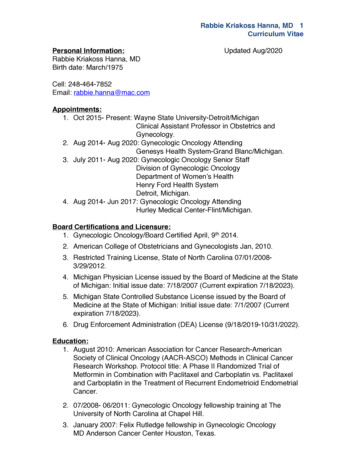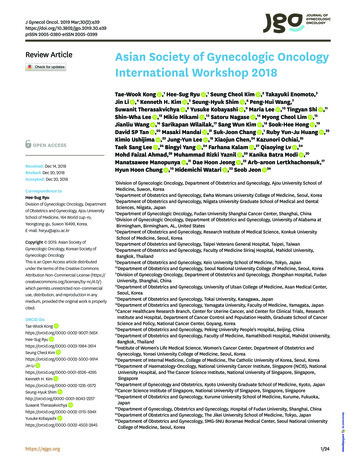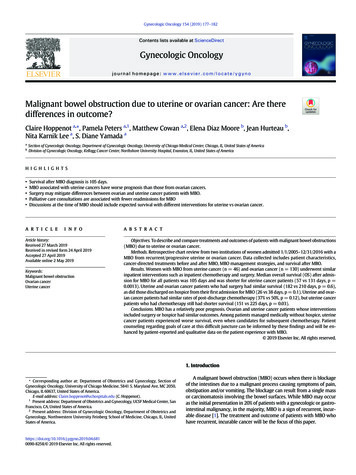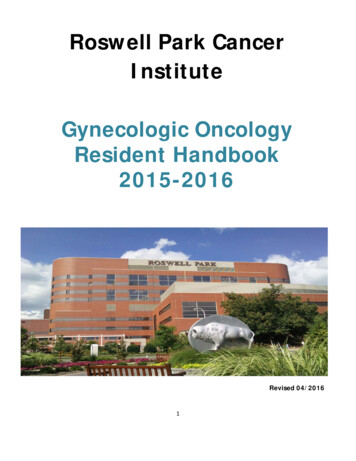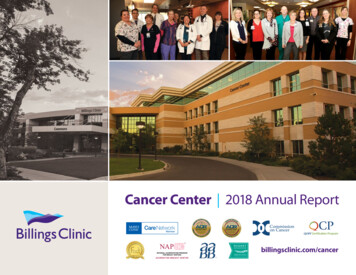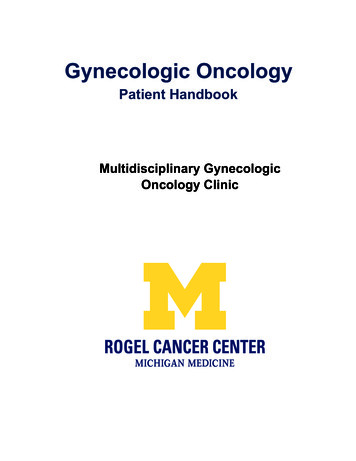
Transcription
Gynecologic OncologyPatient HandbookMultidisciplinary GynecologicOncology Clinic
2A PATIENT’S GUIDE TO GYNECOLOGIC ONCOLOGY
Table of ContentsWelcome/Introduction.5Important Phone Numbers.6TABLE OF CONTENTSGynecologic Oncology HandbookWhen to Call your Doctor or Nurse.7Your Health Care TeamDoctors.9Physician Assistants.9Nursing Staff.10Clinical Pharmacologist.10Social Worker.10Registered Dietitian.10Female Anatomy Drawing.12Treatment OptionsChemotherapy.14Radiation Therapy.15Surgery.16Enhanced Recovery After SurgeryAt Your Pre-operative Visit.17Getting Ready.17The Day Before Surgery.17The Day of Surgery.18Before You Leave Home. 18At the Hospital . .18After Your Surgery .18During Your Hospital Stay .19Steps to Discharge .20Daily Progress .21A PATIENT’S GUIDE TO GYNECOLOGIC ONCOLOGY3
TABLE OF CONTENTSContinued Recovery at Home .22Other Goals .22Questions for Your Surgeon.22Enhanced Recovery Diet Helpful Hints.23Evaluation: Before, During and After TreatmentBiopsy .25Blood Tests.25CAT Scan/CT Scan.25Colposcopy.25ECHO/EKG/MUGA.25Pap Test.26PET Scan.26Tumor Marker Blood Test.26Ultrasound.26Urinalysis/Urine Cultures.26Outpatient Information.27Inpatient Information.27Frequently Asked Questions.28Next StepsEmotional Concerns.31Sexuality.32Support Services and Resources.33Glossary of Terms.35Notes.404A PATIENT’S GUIDE TO GYNECOLOGIC ONCOLOGY
Welcome/IntroductionIf you are reading this handbook, you or someone you love has been diagnosedwith a gynecologic cancer. With that diagnosis, your life has already changedThe doctors, nurses and other experienced health professionals at theUniversity of Michigan Rogel Cancer Center created this handbook to helpexplain the different treatment options available to you, how to care foryourself during treatment and how and when to contact your health care team.Your health care team is available to help answer questions about this materialand to help you decide which treatment options are right for you and give youthe best chances of controlling your cancer.WELCOME / INTRODUCTIONand the days ahead will bring more changes and challenges.As you read through this handbook,you may feel overwhelmed. If so, you’renot alone – most patients and familymembers feel that way as they areintroduced to the new concepts, tools,techniques and resources involvedin cancer treatment. Contact us asyou make your treatment decisions.Important numbers are listedon page 6 of this handbook.A PATIENT’S GUIDE TO GYNECOLOGIC ONCOLOGY5
Important Phone NumbersOffices:Calls after hours are for emergency use. Calls for test results, schedulingquestions, and prescription refills will only be addressed during clinic hours.University of Michigan — Clinic Hours: 8:00am — 5:00pm(734) 647-8906St. Joseph Mercy Hospitals — Clinic Hours: 8:00am — 4:00pm(734) 712-2005MidMichigan Hospital — Clinic Hours: 8:00am — 4:00pm(989) 837-9047University of Michigan Support Services:Billing(855) 855-0863Fertility Counseling Program(734) 763- 4323Center for Reproductive HealthIMPORTANT PHONE NUMBERS6Gyn/Onc Fax - University of Michigan(734) 936-9269Home Med(800) 862-2731Infusion Appointments(734) 647-8908(Use only for same day appointments, if you will be late or need to cancel.)Medical Records(734) 936-5490Nutrition Clinic Appointments(877) 907-0859Patient Financial CounselingPatient Customer Service(734) 232-2621or(877) 326-9155(734) 615-0863or(855) 855-0863Patient Education Program(734) 647-8626Patient Assistance Center(877) 907-0859Radiation Oncology Department(734) 936-4320Social Work(734) 647-8901Symptom Management Program(877) 907-0859University of Michigan Home Care Retail Store(734) 647-3364A PATIENT’S GUIDE TO GYNECOLOGIC ONCOLOGY
When to Call Your Doctor or NurseEveryone is different and may have slightly different complications followingtreatment. In order to help you, we need you to be aware of what is abnormalor unusual for you. Be alert for anything that is different, and report it to yourhealth care team.Call your doctor or nurse if: You are feeling confused, dizzy, overly tired or weak. You notice yellowing of your eyes or skin. You have redness, pain or sores in your mouth causing pain with chewing or Your heartbeat feels unusual or irregular. You have not been able to eat or drink in the past 24 hours. You have been nauseated or vomiting for more than 24 hours. You have not had a bowel movement for 2-3 days. You have diarrhea (loose, watery stool) for more than 24 hours. You have blood in your urine or in your stools (either bright red or blackbowel movements). Please note that iron supplements may turn your stoolsvery dark in color. You have any vaginal bleeding or discharge that is unusual for you. You have a nose bleed that does not stop after 20 minutes. You have pain that is not controlled by your current medication. You notice any changes in your intravenous (IV) catheter or surgical drains(if any), including a change in the appearance of the line, redness, drainage,swelling or pain. You have an oral temperature of 100.5 degrees Fahrenheit (38.1 degrees C)or higher. Do Not take Tylenol or aspirin until you speak with your doctor orWHEN TO CALL YOUR DOCTOR OR NURSEswallowing.nurse.A PATIENT’S GUIDE TO GYNECOLOGIC ONCOLOGY7
You have signs and symptoms of an infection. These include shaking and/or chills, a burning feeling when urinating, a cough, a sore throat, a generalfeeling of tiredness or “flu-like” symptoms, or redness or swelling at theincision sight.Call (734) 647-8906 to speak with your nurse if you haveany other concerns or questions not listed.Our goal in the Gynecologic Oncology (Gyn/Onc) program is to provide youwith the best possible care while you are undergoing treatment for yourcancer. We’d like to introduce you to your health care team. This allows youto know who will be caring for you while you are being treated at the Universityof Michigan Rogel Cancer Center. In the back pocket of this handbook you’llWHEN TO CALL YOUR DOCTOR OR NURSE8find a list of Gyn/Onc faculty and staff.A PATIENT’S GUIDE TO GYNECOLOGIC ONCOLOGY
DoctorsWhile undergoing cancer treatment here at the University of Michigan RogelCancer Center, your care will be provided by a team of health professionalstrained in gynecologic oncology. Gynecologic oncologists are specialty trainedYOUR HEALTH CARE TEAMYour Health Care Teamdoctors who are experts in cancer surgery, chemotherapy, and radiationimplants. Medical oncologists are specialty trained doctors who are experts inchemotherapy. Gynecologists are specialists with expertise in pre-cancers.The University of Michigan Rogel Cancer Center is a teaching hospital, whichmeans we provide for the education of students in health care related fields.Fellows and residents are doctors who are completing specialty training.Medical students are not yet doctors, but soon will be. They are part of theteam and will participate in your care under the guidance and supervision ofyour faculty (“attending”) doctor.Physician AssistantsA Physician Assistant, also known as a PA, is a licensed provider. PAs assistwith patient evaluations on behalf of the attending doctors and may diagnoseand treat patients under the supervision of the attending doctor. Once yourtreatment has been completed, a PA will often be your provider for many ofyour surveillance exams in our Cancer Survivor’s Clinic. These careful follow-upexams allow us to monitor for any hint of relapse of the cancer.A PATIENT’S GUIDE TO GYNECOLOGIC ONCOLOGY9
YOUR HEALTH CARE TEAMNursingNurses are part of your patient care team. They are available to talk abouttreatment and its side effects and can help answer any questions you may have.Please bear in mind that the nurse may not know the specifics of your therapy;so, treatment issues may be referred back for discussion with your doctor. Ahome care coordinator, who is also a nurse, is often involved in helping you andyour family set up home care, including nursing visits, home equipment andother needs.Clinical PharmacologistA clinical pharmacologist may monitor the medications (oral and IV) you aregiven and provide you with education on how to take your medicationcorrectly.Social WorkerA social worker is a licensed professional available to you and your family todiscuss your needs and concerns. They can assist you with finding housing,financial or insurance concerns, referrals to community agencies as well asassistance in dealing with the emotional aspects of going through treatment.Call (734) 647-8901 for an appointment.Registered DietitianA registered dietitian can help you with your nutritional concerns. They willmeet with you one-on-one to provide suggestions for maintaining the bestnutritional health while you are being treated for cancer. These complimentaryservices are offered to cancer center patients. To set up an appointment, call(877) 907-0859. An inpatient registered dietitian is also available when you arein the hospital.10A PATIENT’S GUIDE TO GYNECOLOGIC ONCOLOGY
A PATIENT’S GUIDE TO GYNECOLOGIC ONCOLOGY11
FEMALE ANATOMY DRAWING12A PATIENT’S GUIDE TO GYNECOLOGIC ONCOLOGY
FEMALE ANATOMY DRAWINGNotes:A PATIENT’S GUIDE TO GYNECOLOGIC ONCOLOGY13
Treatment OptionsWhat is Chemotherapy?Chemotherapy (chemo) is a type of treatment that includes a drug or acombination of drugs to treat cancer. Sometimes these medications are called“anti-cancer” drugs. Chemotherapy treatments may be given in many ways: Intravenous (IV) — Through a catheter tube in the vein, normally placedin the arm. Sometimes, your doctor may recommend having an IV infusiondevice. The two most common are peripherally inserted central catheter(PICC) lines and ports. Both of these devices stay in longer than an IVcatheter placed in your vein at the time of your infusion visit. Talk to yourhealth care team for more information about what’s best for you. Orally — Taken by mouth as pills, capsules or liquids that you swallow. Intracavitary — Given directly into a body area, usually the abdomen.The type of chemotherapy you receive will depend on the type of cancer youhave as well as the extent of spread (if any) of cancer. Chemotherapy can beused alone or in combination with other types of treatment, such as surgery orradiation.TREATMENT OPTIONS14If chemotherapy is needed, you will receive additional information.Chemotherapy uses drugs to kill cancer cells. When a chemotherapy drugkills cancer cells, it will also kill a smaller number of normal cells within thebody. This may result in side effects or toxicity from chemotherapy drugs.Chemotherapy affects other organs of the body such as the kidneys, heart, etc.Although severe side effects are uncommon, it is impossible to predict who willexperience these side effects and who will not.A PATIENT’S GUIDE TO GYNECOLOGIC ONCOLOGY
You will be given information about the kind of chemotherapy drugs thatyou will be taking and what side effects might be expected. Talk to your doctor or nurse if you experience any side effects.What is Radiation Therapy?Radiation Therapy uses X-rays as a local treatment. Radiation therapy may beused alone, or in combination with other types of treatments. If you needradiation therapy, you will receive additional information on how to care foryourself during treatment, too.You may feel tired during radiation treatment. Treatment may last six weeksor more and the specifics of this treatment will vary according to what type ofcancer treatment you require.A common side effect of radiation during treatment is diarrhea. Makingchanges to your diet can help with diarrhea and there are medications that canhelp to minimize this problem.(typically the pubic hair region), unlike the more widespread hair lossassociated with some kinds of chemotherapy.A PATIENT’S GUIDE TO GYNECOLOGIC ONCOLOGYTREATMENT OPTIONSHair loss will occur only in the part of the body exposed to radiation treatments15
What if I need surgery?If surgery is needed, you will need time to heal. It takes about two weeks forlaparoscopy incisions to heal and six weeks for open types of surgeryincisions to heal. In general, you can return to light activities and chores onceyou are discharged from the hospital. Light activities can speed recovery.Climbing stairs is okay, if taken slowly. It is alright to ride in a car. Do not driveunless you have been cleared by your doctor. Do not drive if you are takingnarcotic pain medication. Driving is usually safe within two to four weeks aftersurgery.Do not lift heavy objects weighing more than five to ten pounds (a gallon ofmilk weighs 8.6 pounds) for the first six weeks after surgery.Do not resume having sexual intercourse until you are completely healed. Thisvaries from person to person, but generally healing is complete in six to tenweeks. Talk with your doctor before resuming normal sexual activity. You maybe given additional recommendations based on your specific type of surgery.TREATMENT OPTIONS16Feel free to ask as many questions as you need to. Ourgoal is to help you understand how to carefor yourself after treatment.A PATIENT’S GUIDE TO GYNECOLOGIC ONCOLOGY
Enhanced Recovery After SurgeryPreparing for Your SurgeryAt your pre-operative visit Meet your gynecology/oncology doctor and care team. Sign surgical consent form, and ask any questions you may have about Review all instructions with your nurse.Getting ready Review your medications and follow the instructions you were given at yourclinic visit. If you take blood thinners, follow the instructions given to you (if you weretold to stop them, please clarify the date of last dose). Complete any blood work or pre-surgery testing if ordered by yourgynecology/oncology doctor. Continue to eat a regular diet and stay well hydrated. Avoid big meals withmeat a few days prior to the surgery. Try to walk and be as active as you are able every day before your surgery. Make a plan for your recovery at home after surgery and identify who willENHANCED RECOVERY AFTER SURGERYsurgery.support you if needed. You may need assistance with:–– Personal care such as incision care or bathing.–– Transportation to and from the hospital.–– Chores like cooking, shopping, laundry.–– Caring for others including children and pets.The Day Before SurgeryPreparing at home: If you are instructed to do a bowel prep, do as instructed. Try to finish thebowel prep, but if you are unable to do so, your surgery will still proceed asplanned.A PATIENT’S GUIDE TO GYNECOLOGIC ONCOLOGY17
If you were given oral antibiotics, take these as instructed. You may neednausea medications if oral antibiotics make you nauseated. If you have not been given a bowel prep, you may continue regular fooduntil midnight, then clear liquids only. Take a shower with the chlorhexidine soap that was prescribed, makingsure to thoroughly wash your abdomen and skin folds. Review instructions for the day of surgery, including what time and whereENHANCED RECOVERY AFTER SURGERYto check in. Try to rest the night before surgery.The Day of SurgeryBefore you leave home Take a shower with the chlorhexidine soap that was prescribed. You may drink only clear liquids up to 2 hours prior to your scheduledsurgery. However, please do not drink any liquids once you arrive. Bring this paperwork with you to the hospital.At the hospitalAt your assigned arrival time, check in at the Surgery Family Waiting Room. In the pre-operative area, the surgery and anesthesia teams will review theprocedure with you and answer any questions. The pre-op nurse will assist you to use antibacterial skin wipes to preventinfection.After your surgeryYou will wake up in the recovery area and then be taken to your hospital room. A nurse will help you get out of bed. You may walk once you are alertand awake. Physical activity helps shorten your recovery time by keepingmuscles active, helping the return of bowel function, and preventingcomplications like blood clots and pneumonia.18A PATIENT’S GUIDE TO GYNECOLOGIC ONCOLOGY
The urinary catheter may be removed 6 hours after your surgery. Somesurgeries require it to stay in longer. Start with a liquid diet and advance to a regular diet once you feel hungry.Begin with small amounts. You should not eat if you feel nauseated. You will be given some recommendations for a bland diet that is easier on You will have a combination of IV and oral pain medications available tohelp keep you comfortable.During your hospital stay The surgery team will come by your bedside typically twice a day to checkon you and answer any questions you may have. Continue to drink liquids by mouth. Your IV fluids will be turned off once you are able to drink enough fluids bymouth. If you are feeling hungry, you may choose from a general diet, but youshould start with small amounts and try bland foods first. (See page 23.) Perform breathing exercises 10 times an hour when you are awake.ENHANCED RECOVERY AFTER SURGERYyour system. (See page 23.) Sit in a chair for your meals. Try to walk at least 4 times daily and spend most of your day up out of bed. Most patients have some pain or discomfort after surgery. Our goal is tomanage your pain so that you can be active and participate in your recovery. Once you are tolerating food, you will be switched to all oral painmedications. If you are unable to urinate after your catheter is removed, we will help youempty your bladder with a small catheter until you are able to urinate onyour own. Wear the leg squeezers on your lower legs to prevent blood clots.A PATIENT’S GUIDE TO GYNECOLOGIC ONCOLOGY19
In most cases, you may shower on day 2. The care management team will assess your discharge needs and help toarrange support for you at home if needed.Steps to Discharge Tolerate regular food without nausea. Pain controlled with oral medications.ENHANCED RECOVERY AFTER SURGERY20 Be able to walk and get out of bed. Have a safe discharge plan in place. Be without any complications. If you are discharged with blood thinner injections (Lovenox), your nursewill teach you how to give yourself injections before you go home. If you had laparoscopic surgery, the goal is to go home either on day ofsurgery or the next day. Some open surgery patients are ready to go home asearly as day 2 or 3. You will be ready for discharge when meeting all of yourmilestones. Pick up medicines from the hospital pharmacy.A PATIENT’S GUIDE TO GYNECOLOGIC ONCOLOGY
Daily ProgressDay 1WalksENHANCED RECOVERY AFTER SURGERYBreathing ExercisesDay 2WalksBreathing ExercisesDay 3WalksBreathing ExercisesDay 4WalksBreathing ExercisesDay 5WalksBreathing ExercisesA PATIENT’S GUIDE TO GYNECOLOGIC ONCOLOGY21
Continued recovery at home You may need assistance from family or friends for the first few days athome. Your appetite may be slow at first, but continue to eat a regular diet astolerated. Drink plenty of fluids to stay hydrated.ENHANCED RECOVERY AFTER SURGERY Continue to take pain medications as needed. If you are taking narcotics,you may experience side effects such as sleepiness, nausea, dizziness, andconstipation. You may need to take a stool softener if you are taking painmedications. Minimize use of narcotics because they are addictive. Continue to walk and be as active as tolerated, but avoid strenuousactivity.Other goalsQuestions for your surgeon22A PATIENT’S GUIDE TO GYNECOLOGIC ONCOLOGY
Enhanced Recovery Diet Helpful HintsNutrition is an important part of recovering from surgery.The effects of surgery and anesthesia may cause you to experience some nauseaor a decreased appetite in the first few days of your recovery.You may pick and choose from the adult general diet, but we recommend thatYou should only eat if you are feeling hungry. If you experience nausea orvomiting, you should discuss this with your care team.Below is a list of tips to help guide you: Avoid spicy, greasy or fried foods. Avoid carbonated beverages, or let them go flat prior to drinking. Avoid high-fiber foods that may be harder to digest, like raw vegetables orsalad greens. Avoid foods that may cause indigestion, like tomato sauces and chili, or dairyproducts for some patients.Examples of bland food choices include: Oatmeal Soups or broths Applesauce Pudding Toast or English muffin Popsicles Bagel Jello Cream of wheat Plain pasta Crackers Rice Cereal Baked potatoes Yogurt Cooked vegetables Scrambled eggs Chicken breastENHANCED RECOVERY AFTER SURGERYyou start slow and choose foods that are bland and easy-to-digest. Milk shakeA PATIENT’S GUIDE TO GYNECOLOGIC ONCOLOGY23
You may order whatever sounds appealing to you, and then slowly advanceyour diet to what you would normally eat. Continue to drink plenty of fluids.If you have any questions or concerns about your diet, please discuss it withyour care team.ENHANCED RECOVERY AFTER SURGERY24A PATIENT’S GUIDE TO GYNECOLOGIC ONCOLOGY
Before, during and after treatment, you may undergo many tests. The testsEVALUATIONSEvaluation: Before, During and After Treatmentyou receive will depend on your disease, your treatment plan and/or your pasthistory. Some tests may be repeated during the treatment process. This is tomonitor for changes that may occur. Some of the tests are:BiopsyRemoves a small piece of tissue or skin to see if cancer or precancer is present.Blood TestsBlood tests such as CBC, liver and kidney tell how well you will be able totolerate cancer treatment such as surgery or chemotherapy.CAT or CT Scan (Computed Axial Tomography)An imaging study where multiple X-Rays (cross-sectional images) are taken of apart of the body to produce pictures of internal organs. Injection of a dye isneeded in most scans.ColposcopyUse of a binocular microscope to evaluate the cervix in women with pre-cancerof the cervix.ECHO/EKG/MUGA (Echo – Echocardiography; EKG – Electrocardiogram;MUGA – Multigated Acquisition)These are different tests that determine how your heart is functioning and oneor all may be necessary prior to surgery or chemotherapy.A PATIENT’S GUIDE TO GYNECOLOGIC ONCOLOGY25
EVALUATIONS Pap TestA gentle scraping of the cervix or vagina to see if cancer or precancer(dysplasia) may be present.PET Scan (Positron Emission Tomography)An imaging study in which a special sugar tagged with short acting radiation isinjected into the body. The sugar is consumed as fuel more readily by cancercells, and this shows up as a “hot spot” on the images, allowing the location ofcancer cells to be determined.Tumor Marker Blood TestsA tumor marker is an indicator for the presence of cancer. The marker is asubstance made by a cancer cell that can be measured in the blood and may godown in response to treatment.UltrasoundAn imaging study that uses sound waves to construct an image of internalorgans.Urinalysis and Urine CulturesChecks for the presence of a urinary tract infection and assesses your kidneyfunction.26A PATIENT’S GUIDE TO GYNECOLOGIC ONCOLOGY
Outpatient InformationAt the University of Michigan, the Gynecology/Oncology clinic is located onFloor 1 of the Rogel Cancer Center.If you require outpatient chemotherapy, you will most likely be treated in thechemotherapy may be given at other sites in the cancer center and medicalcenter, including the Med Inn, or off-site. Your chemotherapy nurse will makesure you know your treatment location.Depending on your treatment, you may need to stay in the Ann Arbor area foran extended period of time. Please talk to a nurse or social worker regardingyour lodging needs.Inpatient Information – Gynecologic Oncology UnitIf you need hospitalization for surgery or some types of chemotherapy, youwill most likely be on the Gynecologic Oncology Unit.Visiting hours and visitorsOUTPATIENT AND INPATIENT INFORMATIONInfusion Center, located on Floor B1 of the cancer center. Some outpatientVisiting hours are unrestricted. There are minimal limitations on the number ofvisitors allowed in a private room. If you are in a semi-private room, you areasked to limit visitors to two at one time. Any visitors who have colds, flu orother illnesses are asked to check-in at the nurse’s station on the unit andprobably shouldn’t visit until they are healthy. Young children may visit if theyhave not been recently exposed to contagious diseases (such as chickenpox,measles, colds or flu) and are healthy.A PATIENT’S GUIDE TO GYNECOLOGIC ONCOLOGY27
Frequently Asked QuestionsQ: Will my hair fall out from chemotherapy and if so, when does that occur?A: The degree of hair loss (alopecia) varies from person to person and alsodepends on which chemotherapy drugs are prescribed. Hair loss caused bychemotherapy may become apparent over two to three weeks. After stoppingchemotherapy, initial regrowth may be seen in four to six weeks. If you aretreated with radiation therapy, you will probably lose pubic hair, but youwill not lose the hair on your head. Hair loss caused by radiation is usuallypermanent.Q: If my blood counts drop from chemotherapy, what will be done?A: Depending on your symptoms, you may receive medications to increase yourwhite cells. Other medications such as antibiotics may also beprescribed. Occasionally, a blood transfusion may be necessary. If blood countsare very low, future chemother
A PATIENT'S GUIDE TO GYNECOLOGIC ONCOLOGY 5 ELCOE INTODUCTION If you are reading this handbook, you or someone you love has been diagnosed with a gynecologic cancer. With that diagnosis, your life has already changed and the days ahead will bring more changes and challenges. The doctors, nurses and other experienced health professionals at the
